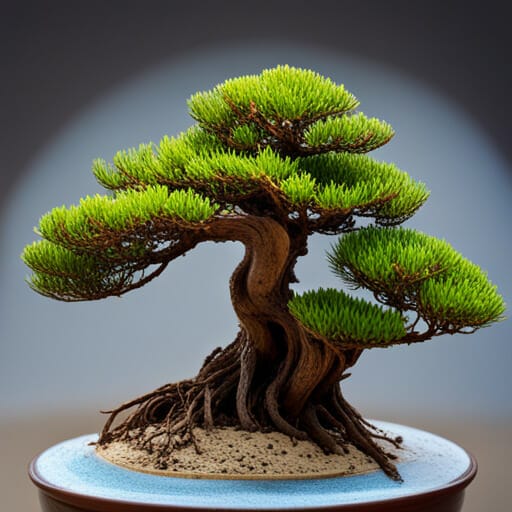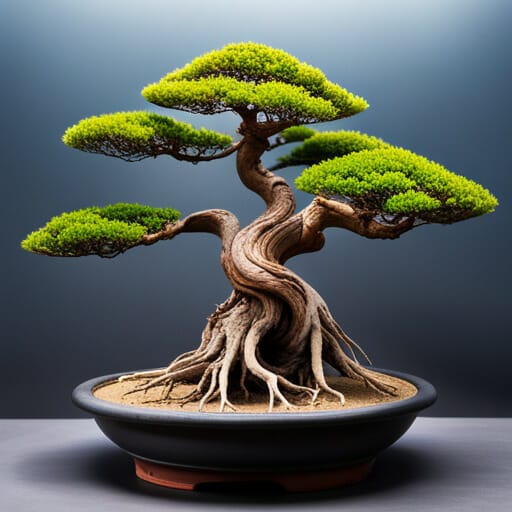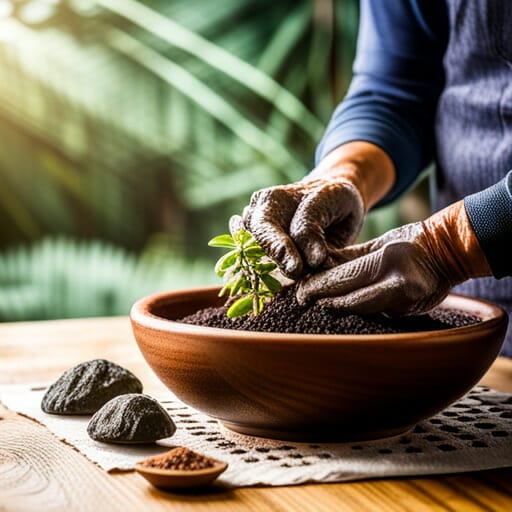Bonsai enthusiasts understand the importance of providing the ideal conditions for their miniature trees to thrive. When it comes to juniper bonsai, the choice of soil mix is crucial for their growth and overall health.
But what makes the perfect soil mix for optimal growth? In this article, we will explore the essential guide to juniper bonsai soil and discover the perfect mix that will ensure your juniper bonsai flourishes.
Juniper bonsai soil requirements are specific, and using the wrong soil can have detrimental effects on the tree’s well-being. The ideal soil mix consists of a 2:1:1 blend of Akadama, lava rock, and pumice. Akadama provides the necessary acidity, while lava rock and pumice aid in aeration and drainage. It is important to avoid using regular potting soil or cactus and succulent soil, as they are unsuitable for juniper bonsai.
By understanding the process of making the soil mix and the importance of repotting every few years, you can ensure that your juniper bonsai receives the optimal soil conditions for its growth.
So let’s delve into the essential guide to juniper bonsai soil and discover the perfect mix for optimal growth.
Contents
Quick Points
- Juniper bonsai soil requires good water retention, drainage, and aeration, and should be slightly acidic with a pH level between 5.5 and 6.5.
- The ideal soil mix for juniper bonsai is a 2:1:1 blend of Akadama, lava rock, and pumice, with Akadama being a granular clay-like soil commonly used in bonsai cultivation.
- Unsuitable soils for juniper bonsai include regular potting soil, cactus and succulent soil, and reused old bonsai soil.
– When making juniper bonsai soil mix at home, it is important to separate different particles by size using soil sieves and to mix the soil well using your hands.
Juniper Bonsai Soil Requirements

Juniper bonsai require soil that has good water retention, drainage, and aeration, is low in nutrients, and has a slightly acidic pH level between 5.5 and 6.5.
These soil requirements are crucial for the optimal growth and health of juniper bonsai.
It is important to note that juniper bonsai do not grow well in larger particle soil, so it is recommended to use small particle sizes of 1/16 to 1/4 inches for the soil mix.
The ideal soil mix for juniper bonsai is a 2:1:1 blend of Akadama, lava rock, and pumice.
Akadama, a granular clay-like soil, is commonly used in bonsai cultivation and provides the slightly acidic pH level preferred by juniper bonsai.
It is also important to avoid using unsuitable soil such as regular potting soil or cactus and succulent soil, as they do not meet the specific requirements of juniper bonsai.
By understanding and providing the right soil conditions, juniper bonsai can thrive and achieve optimal growth.
Ideal Soil Mix

To achieve the desired conditions for healthy juniper bonsai growth, it is crucial to carefully select and blend the appropriate combination of soil components. The ideal soil mix for juniper bonsai consists of a 2:1:1 blend of Akadama, lava rock, and pumice. Akadama, a granular clay-like soil commonly used in bonsai cultivation, provides good water retention and a slightly acidic pH level, which is preferred by juniper bonsai. Lava rock and pumice aid in aeration and drainage, ensuring that the roots receive sufficient oxygen. When choosing lava rock and pumice, it is recommended to opt for slightly acidic to neutral variations. By using this specially designed bonsai soil mix, juniper bonsai can achieve optimal growth and health.
| Soil Component | Characteristics |
|---|---|
| Akadama | Granular clay-like soil, slightly acidic pH level |
| Lava Rock | Provides aeration and drainage, choose slightly acidic to neutral variations |
| Pumice | Aids in aeration and drainage, choose slightly acidic to neutral variations |
Process of Making Soil Mix

The process of creating the soil mix for juniper bonsai involves carefully selecting and blending different soil components in specific ratios to ensure proper water retention, drainage, and aeration. To make the ideal soil mix for juniper bonsai, follow these steps:
- Gather the necessary materials:
– soil
– a soil scoop (optional)
– a soil sieve
– containers.
- Use soil sieves to separate out different particles by size before mixing the soil.
- Prepare a clean container for mixing the soil.
- Pour each type of soil into the container according to the 2:1:1 blend ratio (Akadama, lava rock, and pumice).
- Mix the soil well using your hands.
By following this process, you can create a well-balanced soil mix that provides the optimal conditions for the growth and health of your juniper bonsai. Remember to use small particle sizes and avoid using unsuitable soils, such as regular potting soil or reused bonsai soil.
Frequently Asked Questions
Can I use regular potting soil for my juniper bonsai?
Using regular potting soil for juniper bonsai is not recommended. Junipers have specific soil requirements, including good water retention, drainage, and aeration, which regular potting soil may not provide. It is best to use a specially designed bonsai soil mix for optimal growth.
How often should I water my juniper bonsai?
The watering frequency for juniper bonsai depends on several factors such as the size of the pot, the climate, and the soil mix. It is important to allow the soil to dry out slightly between waterings to prevent root rot.
Can I use organic matter in my juniper bonsai soil mix?
Using organic matter in a juniper bonsai soil mix can hinder optimal growth and health. It is important to note that organic matter is not necessary for juniper bonsai, as they prefer a soil low in nutrients.
What are some signs that my juniper bonsai needs to be repotted?
Signs that a juniper bonsai needs to be repotted include root bound conditions, such as roots circling the pot, lack of drainage, waterlogged soil, stunted growth, yellowing or wilting leaves, and the soil drying out quickly.
Can I reuse soil from my old juniper bonsai for repotting?
No, reusing soil from old juniper bonsai for repotting is not recommended. It can spread diseases and may not provide the necessary water retention, drainage, and aeration required for optimal growth.




